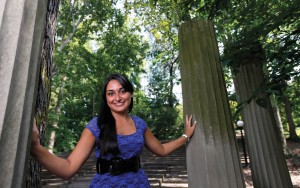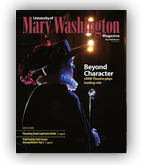
An undergraduate research grant from UMW allowed junior Ana Tkabladze to spend part of last summer excavating ancient artifacts in Spain and Portugal. Photo by Norm Shafer.
Growing up in the Republic of Georgia, Ana Tkabladze ’14 was surrounded by remnants and relics of the ancient world. She dreamed of someday learning about the sites and making her own discoveries.
Now a classics major pursuing a concentration in classical archaeology, Tkabladze is already leaving her mark.
Last summer the UMW junior spent three weeks on the Spanish island of Menorca and in Portugal as part of a team excavating and analyzing thousand-year-old artifacts.
“I’m basically helping real archaeologists find out about that era,” Tkabladze said. “That’ll go in history later, which is pretty exciting.”
She is one of several UMW students who received undergraduate research grants for the summer. Each year, a few students in the classics, philosophy, and religion department go on excavations, either through UMW undergraduate research grants like the one Tkabladze received or as part of an independent study.
“Ana is an excellent example of those of our students who have been able to go out and excavate Greek and Roman material,” said Professor of Classics Liane Houghtalin.
Houghtalin showed Tkabladze how to search for excavation opportunities in Europe, helped her apply for the research grant, and kept in touch with her frequently throughout the program.
“I get to hear about what’s going on and live vicariously through a student who is doing what I do, but for the first time,” Houghtalin said of her role as an adviser. “It gives me a fresh perspective.”
In Menorca, Tkabladze and the international team of students and scholars started the day at 4:30 a.m. and drove an hour to the excavation site. They spent each morning digging for coins and pieces of pottery, bones, and other fragments – clues to how the ancient people of Menorca lived.
Then, in the labs in both Menorca and Portugal, the team analyzed the artifacts to determine how old they were, where they came from, and their significance to the region.
“Our goal was to try to see what influences that area had and what kind of trade systems existed,” said Tkabladze, who moved to the U.S. with her family about 10 years ago.
For her, the project is one step toward her goal of becoming a professor in the field of her lifelong passion. “I can’t see myself doing anything else,” she said. “It’s what I love.”
